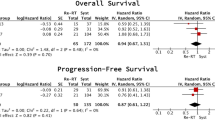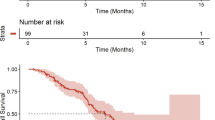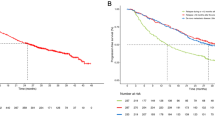Abstract
Background
Whether epidermal growth factor receptor (EGFR) tyrosine kinase inhibitors (TKIs) combined with chemotherapy can delay the occurrence of brain metastasis (BM) is unclear.
Objective
This retrospective study aimed to evaluate whether EGFR–TKIs combined with chemotherapy can delay BM and decrease the incidence of BM as initial progression.
Patients and Methods
The data of 100 patients with EGFR-mutant advanced lung adenocarcinoma were retrospectively reviewed. The patients had no BM at initial diagnosis, and BM occurred during the treatment. Patients received EGFR–TKI only or EGFR–TKI combined with chemotherapy. Intracranial progression-free survival (iPFS), systemic progression-free survival (PFS), and overall survival (OS) were evaluated.
Results
The overall median OS was 39 months (95% confidence interval (CI), 35.6–42.4 months). The median OS of EGFR–TKI combined with chemotherapy and EGFR–TKI only are 41 months (95% CI 35.5–46.5 months) and 39 months (95% CI 36.8–41.2 months), respectively. Patients in the combination treatment group had longer PFS (16 vs. 10 months; P = 0.030) and iPFS (21 vs. 14 months; P = 0.026). Further, as initial progression, fewer patients developed BM in the combined treatment group compared with the EGFR–TKI-only group (30.6% vs. 52.9%, P = 0.002) with a hazard ratio of 0.64 (95% CI 0.43–0.96). After controlling for significant covariables in a multivariable model, the different treatment strategies were independently associated with improved iPFS.
Conclusions
In this retrospective analysis, EGFR–TKIs combined with chemotherapy could improve PFS. Further, the combined treatment could delay BM occurrence and decrease the incidence of BM as initial progression.


Similar content being viewed by others
Change history
17 July 2019
The article Epidermal Growth Factor Receptor (EGFR)–Tyrosine Kinase Inhibitors (TKIs) Combined with Chemotherapy Delay Brain Metastasis in Patients with EGFR-Mutant Lung Adenocarcinom, written by Changhui Li, Bo Zhang, Jindong Guo, Fang Hu, Wei Nie, Xiaoxuan Zheng, Lixin Wang, Yuqing Lou, Yinchen Shen, Baohui Han, Xueyan Zhang, was originally published electronically on the publisher’s internet portal (currently SpringerLink) on 03 July 2019 with open access. With the author(s)’ decision to step back from Open Choice, the copyright of the article changed on 17 July 2019 to © Springer Nature Switzerland AG 2019 and the article is forthwith distributed under the terms of copyright.
References
Merchut MP. Brain metastases from undiagnosed systemic neoplasms. Arch Intern Med. 1989;149(5):1076–80. https://doi.org/10.1001/archinte.1989.00390050066013.
Li L, Luo S, Lin H, et al. Correlation between EGFR mutation status and the incidence of brain metastases in patients with non-small cell lung cancer. J Thorac Dis. 2017;9(8):2510–20. https://doi.org/10.21037/jtd.2017.07.57.
Hsu F, De Caluwe A, Anderson D, Nichol A, Toriumi T, Ho C. EGFR mutation status on brain metastases from non-small cell lung cancer. Lung Cancer. 2016;96:101–7. https://doi.org/10.1016/j.lungcan.2016.04.004.
Shin DY, Na II, Kim CH, Park S, Baek H, Yang SH. EGFR mutation and brain metastasis in pulmonary adenocarcinomas. J Thorac Oncol. 2014;9:195–9. https://doi.org/10.1097/JTO.0000000000000069.
Yoshida T, Yoh K, Niho S, et al. RECIST progression patterns during EGFR tyrosine kinase inhibitor treatment of advanced non-small cell lung cancer patients harboring an EGFR mutation. Lung Cancer. 2015;90:477–83. https://doi.org/10.1016/j.lungcan.2015.09.025.
Gallego Perez-Larraya J, Hildebrand J. Brain metastases. Handb Clin Neurol. 2014;121:1143–57. https://doi.org/10.1016/B978-0-7020-4088-7.00077-8.
Lynch TJ, Bell DW, Sordella R, et al. Activating mutations in the epidermal growth factor receptor underlying responsiveness of non-small cell lung cancer to gefitinib. N Engl J Med. 2014;350:2129–39. https://doi.org/10.1056/NEJMoa040938.
Mok TS, Wu YL, Thongprasert S, et al. Gefitinib or carboplatin–paclitaxel in pulmonary adenocarcinoma. N Engl J Med. 2009;361:947–57. https://doi.org/10.1056/NEJMoa0810699.
Gao G, Ren S, Li A, et al. Epidermal growth factor receptor–tyrosine kinase inhibitor therapy is effective as first–line treatment of advanced non-small–cell lung cancer with mutated EGFR: a meta–analysis from six phase III randomized controlled trials. Int J Cancer. 2012;131:822–9. https://doi.org/10.1002/ijc.27396.
Rosell R, Carcereny E, Gervais R, et al. Erlotinib versus standard chemotherapy as first–line treatment for European patients with advanced EGFR mutation–positive non-small–cell lung cancer (EURTAC): a multicentre, open–label, randomised phase 3 trial. Lancet Oncol. 2012;13:239–46. https://doi.org/10.1016/S1470-2045(11)70393-X.
Han Baohui, Jin Bo, Chu Tianqing, et al. Combination of chemotherapy and gefitinib as first–line treatment for patients with advanced lung adenocarcinoma and sensitive EGFR mutations: a randomized controlled trial. Int J Cancer. 2017;141:1249–56. https://doi.org/10.1002/ijc.30806.
Cheng Ying, Murakami Haruyasu, Yang Pan-Chyr, et al. Randomized phase II trial of gefitinib with and without pemetrexed as first–Line therapy in patients with advanced nonsquamous non-small–cell lung cancer with activating epidermal growth factor receptor mutations. J Clin Oncol. 2016;34:3258–66. https://doi.org/10.1200/JCO.2016.66.9218.
Wu YL, Lee JS, Thongprasert S, et al. Intercalated combination of chemotherapy and erlotinib for patients with advanced stage non-small–cell lung cancer (FASTACT–2): a randomised, doubleblind trial. Lancet Oncol. 2013;14:777–86. https://doi.org/10.1016/S1470-2045(13)70254-7.
Sugawara S, Oizumi S, Minato K, et al. Randomized phase II study of concurrent versus sequential alternating gefitinib and chemotherapy in previously untreated non-small cell lung cancer with sensitive EGFR mutations: NEJ005/TCOG0902. Ann Oncol. 2015;26:888–94. https://doi.org/10.1093/annonc/mdv063.
Nakamura A, Inoue A, Morita S, et al. Phase III study comparing gefitinib monotherapy (G) to combination therapy with gefitinib, carboplatin, and pemetrexed (GCP) for untreated patients (pts) with advanced non-small cell lung cancer (NSCLC) with EGFR mutations (NEJ009). J Clin Oncol. 2018;36(15_suppl):9005. https://doi.org/10.1200/jco.2018.36.15_suppl.9005.
Shin DY, Na II, Kim CH, Park S, Baek H, Yang SH. EGFR mutation and brain metastasis in pulmonary adenocarcinomas. J Thorac Oncol. 2014;9:195–9. https://doi.org/10.1097/JTO.0000000000000069.
Sperduto PW, Kased N, Roberge D, et al. Summary report on the graded prognostic assessment: an accurate and facile diagnosis–specific tool to estimate survival for patients with brain metastases. J Clin Oncol. 2012;30:419–25. https://doi.org/10.1200/JCO.2011.38.0527.
Welzel G, Fleckenstein K, Schaefer J, et al. Memory function before and after whole brain radiotherapy in patients with and without brain metastases. Int J Radiat Oncol Biol Phys. 2008;72:1311–8. https://doi.org/10.1016/j.ijrobp.2008.03.009.
Peters S, Bexelius C, Munk V, et al. The impact of brain metastasis on quality of life, resource utilization and survival in patients with non-small–cell lung cancer. Cancer Treat Rev. 2016;45:139–62. https://doi.org/10.1016/j.ctrv.2016.03.009.
Roughley A, Damonte E, Taylor-Stokes G, et al. Impact of brain metastases on quality of life and estimated life expectancy in patients with advanced non-small cell lung cancer. Value Health. 2014;17:A650. https://doi.org/10.1016/j.jval.2014.08.2364.
Fernandes AW, Wu B, Turner RM. Brain metastases in non-small cell lung cancer patients on epidermal growth factor receptor tyrosine kinase inhibitors: symptom and economic burden. J Med Econ. 2017;20:1136–47. https://doi.org/10.1080/13696998.2017.1361960.
Zhang J, Shi X, Cai D, et al. MINI01.11: radiotherapy plus EGFR TKIs for brain metastasis in EGFR–mutant non-small cell lung cancer: a retrospective analysis of a single institution: topic: medical oncology. J Thorac Oncol. 2016;11:S263. https://doi.org/10.1111/cas.13079.
Jiang Tao, Min Weijie, Li Yanan, et al. Radiotherapy plus EGFR TKIs in non-small cell lung cancer patients with brain metastases: an update meta-analysis. Cancer Med. 2016;5:1055–65. https://doi.org/10.1002/cam4.673.
Chen Yongshun, Yang Jing, Li Xue, et al. First–line epidermal growth factor receptor (EGFR)–tyrosine kinase inhibitor alone or with whole–brain radiotherapy for brain metastases in patients with EGFR–mutated lung adenocarcinoma. Cancer Sci. 2016;107:1800–5. https://doi.org/10.1111/cas.13079.
Soria JC, Ohe Y, Vansteenkiste J, Reungwetwattana T, Chewaskulyong B, Lee KH, et al. Osimertinib in untreated EGFR-mutated advanced non-small-cell lung cancer. N Engl J Med. 2018;378:113–25. https://doi.org/10.1056/NEJMoa1713137.
Aguiar PN Jr, Haaland B, Park W, et al. Cost-effectiveness of osimertinib in the first–line treatment of patients with EGFR–mutated advanced non-small cell lung cancer. JAMA Oncol. 2018;4:1080–4. https://doi.org/10.1001/jamaoncol.2018.1395.
BinWu XiaohuaGu, Qiang Z. Cost-effectiveness of osimertinib for EGFR mutation–positive non-small cell lung cancer after progression following First-Line EGFR TKI therapy. J Thorac Oncol. 2018;13:184–93. https://doi.org/10.1016/j.jtho.2017.10.012.
Yang Z, Tam KY. Combination strategies using EGFR–TKI in NSCLC therapy: learning from the gap between pre–clinical results and clinical outcomes. Int J Biol Sci. 2018;14:204–16. https://doi.org/10.7150/ijbs.22955.
Yang CH, Huang CJ, Yang CS, et al. Gefitinib reverses chemotherapy resistance in gefitinibinsensitive multidrug resistant cancer cells expressing ATP–binding cassette family protein. Cancer Res. 2005;65:6943–9. https://doi.org/10.1158/0008-5472.
Okabe T, Okamoto I, Tsukioka S, et al. Synergistic antitumor effect of S–1 and the epidermal growth factor receptor inhibitor gefitinib in nonsmall cell lung cancer cell lines: role of gefitinibinduced down–regulation of thymidylate synthase. Mol Cancer Ther. 2008;7:599–606. https://doi.org/10.1158/1535-7163.
Hsiao SH, Lu YJ, Li YQ, et al. Osimertinib (AZD9291) attenuates the function of multidrug resistance–linked ATP–binding cassette transporter ABCB1 in vitro. Mol Pharm. 2016;13:2117–25. https://doi.org/10.1021/acs.molpharmaceut.6b00249.
Dai CL, Tiwari AK, Wu CP, et al. Lapatinib (Tykerb, GW572016) reverses multidrug resistance in cancer cells by inhibiting the activity of ATP–binding cassette subfamily B member 1 and G member 2. Cancer Res. 2008;68:7905–14. https://doi.org/10.1158/0008-5472.
Cortes-Dericks L, Carboni GL, Schmid RA, et al. Putative cancer stem cells in malignant pleural mesothelioma show resistance to cisplatin and pemetrexed. Int J Oncol. 2010;37:437–44. https://doi.org/10.3892/ijo_00000692.
Mani SA, Guo W, Liao MJ, et al. The epithelial–mesenchymal transition generates cells with properties of stem cells. Cell. 2008;133(4):704–15. https://doi.org/10.1016/j.cell.2008.03.027.Dal.
La Monica S, Madeddu D, Tiseo M, et al. Combination of gefitinib and pemetrexed prevents the acquisition of TKI resistance in NSCLC cell lines carrying EGFR-activating mutation. J Thorac Oncol. 2016;11(7):1051–63. https://doi.org/10.1016/j.jtho.2016.03.006.
Liao S, Penney BC, Wroblewski K, et al. Prognostic value of metabolic tumor burden on 18F–FDG PET in nonsurgical patients with non-small cell lung cancer. Eur J Nucl Med Mol Imaging. 2012;39:27–38. https://doi.org/10.1007/s00259-011-1934-6.
Bazan JG, Duan F, Snyder BS, et al. Metabolic tumor volume predicts overall survival and local control in patients with stage III non-small cell lung cancer treated in ACRIN 6668/RTOG 0235. Eur J Nucl Med Mol Imaging. 2017;44:17–24. https://doi.org/10.1007/s00259-016-3520-4.
Acknowledgements
The authors greatly appreciate all patients who contributed to this study.
Author information
Authors and Affiliations
Corresponding authors
Ethics declarations
Funding
This study was funded by the Science and Technology Commission of Shanghai Municipality, China (No.18441904700), and the nurture projects for basic research of Shanghai Chest Hospital (No. 2018YNJCM05).
Conflict of interest
Changhui Li, Bo Zhang, Jindong Guo, Fang Hu, Wei Nie, Xiaoxuan Zheng, Lixin Wang, Yuqing Lou, Yinchen Shen, Baohui Han, and Xueyan Zhang declare that they have no conflicts of interest that might be relevant to the content of this article.
Rights and permissions
About this article
Cite this article
Li, C., Zhang, B., Guo, J. et al. Epidermal Growth Factor Receptor (EGFR)–Tyrosine Kinase Inhibitors (TKIs) Combined with Chemotherapy Delay Brain Metastasis in Patients with EGFR-Mutant Lung Adenocarcinoma. Targ Oncol 14, 423–431 (2019). https://doi.org/10.1007/s11523-019-00649-1
Published:
Issue Date:
DOI: https://doi.org/10.1007/s11523-019-00649-1




